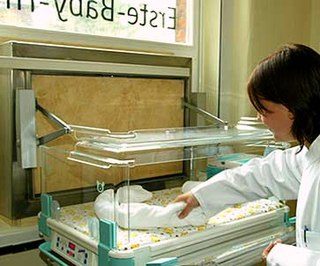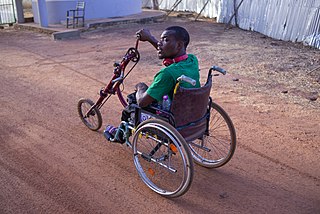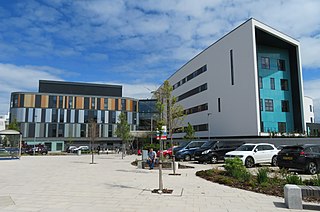
The Czech Republic, also known as Czechia, is a landlocked country in Central Europe. Historically known as Bohemia, it is bordered by Austria to the south, Germany to the west, Poland to the northeast, and Slovakia to the southeast. The Czech Republic has a hilly landscape that covers an area of 78,871 square kilometers (30,452 sq mi) with a mostly temperate continental and oceanic climate. The capital and largest city is Prague; other major cities and urban areas include Brno, Ostrava, Plzeň and Liberec.

Václav Klaus is a Czech economist and politician who served as the second president of the Czech Republic from 2003 to 2013. From July 1992 until the dissolution of Czechoslovakia in January 1993, he served as the second and last prime minister of the Czech Republic while it was a federal subject of the Czech and Slovak Federative Republic, and then as the first prime minister of the newly independent Czech Republic from 1993 to 1998.

Broadmoor Hospital is a high-security psychiatric hospital in Crowthorne, Berkshire, England. It is the oldest of England's three high-security psychiatric hospitals, the other two being Ashworth Hospital near Liverpool and Rampton Secure Hospital in Nottinghamshire. The hospital's catchment area consists of four National Health Service regions: London, Eastern, South East and South West. It is managed by the West London NHS Trust.

Compulsory sterilization, also known as forced or coerced sterilization, is a government-mandated program to involuntarily sterilize a specific group of people. Sterilization removes a person's capacity to reproduce, and is usually done through surgical procedures. Several countries implemented sterilization programs in the early 20th century. Although such programs have been made illegal in most countries of the world, instances of forced or coerced sterilizations persist.

Rampton Secure Hospital is a high-security psychiatric hospital near the village of Woodbeck between Retford and Rampton in Nottinghamshire, England. It is one of three high-security psychiatric hospitals in England, alongside Ashworth Hospital in Merseyside and Broadmoor Hospital in Berkshire. It is managed by Nottinghamshire Healthcare NHS Foundation Trust.

Catherine, Princess of Wales,, is a member of the British royal family. She is married to William, Prince of Wales, heir apparent to the British throne.

Ashworth Hospital is a high-security psychiatric hospital in Maghull, 10 miles (16 km) northeast of Liverpool. It is a part of Mersey Care NHS Foundation Trust, catering to patients with psychiatric health needs that require treatment in conditions of high security.

A baby hatch or baby box is a place where people can bring babies, usually newborn, and abandon them anonymously in a safe place to be found and cared for. This kind of arrangement was common in the Middle Ages and in the 18th and 19th centuries, when the device was known as a foundling wheel. Foundling wheels were taken out of use in the late 19th century, but a modern form, the baby hatch, began to be introduced again from 1952 and since 2000 has come into use in many countries, most notably in Pakistan where there are more than 300. They can also be found in Germany, where there are around 100, Czech Republic (76) and Poland (67).
Child and Adolescent Mental Health Services (CAMHS) is the name for NHS-provided services in the United Kingdom for children, generally until school-leaving age, who are having difficulties with their emotional well-being or are deemed to have persistent behavioural problems. CAMHS are organised locally, and the exact services provided may vary, often by local government area.

The Priory Group is a provider of mental health care facilities in the United Kingdom. The group operates at more than 500 sites with over 7,000 beds. Its flagship hospital is the Priory Hospital, Roehampton, which is best known for treating celebrities particularly for drug addiction. The Priory Group also manages schools, some for students with autism spectrum disorders through Priory Education and Children’s Services. Some of its facilities are run by its subsidiary Partnerships in Care. In January 2019 it opened its first overseas school in partnership with the Abu Dhabi Department of Education and Knowledge.
Liz Carr is an English actress, comedian, broadcaster and international disability rights activist.

Ninewells Hospital is a large teaching hospital, based on the western edge of Dundee, Scotland. It is internationally renowned for introducing laparoscopic surgery to the UK as well as being a leading centre in developing fields such as the management of cancer, medical genetics and robotic surgery. Within the UK, it is also a major NHS facility for psychosurgery. The medical school was ranked first in the UK in 2009. The hospital has nursing and research links with the University of Dundee and is managed by NHS Tayside.

The National Health Service (NHS) is the umbrella term for the publicly funded healthcare systems of the United Kingdom, comprising the National Health Service in England, NHS Scotland and NHS Wales. Health and Social Care in Northern Ireland was created separately and is often locally referred to as "the NHS". The original three systems were established in 1948 as part of major social reforms following the Second World War. The founding principles were that services should be comprehensive, universal and free at the point of delivery—a health service based on clinical need, not ability to pay. Each service provides a comprehensive range of health services, provided without charge for people ordinarily resident in the United Kingdom apart from dental treatment and optical care. In England, NHS patients have to pay prescription charges; some, such as those aged over 60, or those on certain state benefits, are exempt.

The Mental Disability Advocacy Center (MDAC) is an international human rights organisation founded in Hungary in 2002. It is headquartered in Budapest.

Simon Laurence Stevens, Baron Stevens of Birmingham is Chair of Cancer Research UK and an independent member of the House of Lords. He served as the eighth Chief Executive of NHS England from 2014 to 2021.

Disability in Ghana has a massive amount of stigma; children or people who are born disabled or deformed are assumed to be possessed by evil spirits.
Reliable information about disability in North Korea, like other information about social conditions in the country, is difficult to find. As of 2016, North Korea is a signatory to the United Nations Convention on the Rights of Persons with Disabilities.

The Royal Hospital for Children and Young People is a hospital that specialises in paediatric healthcare. The hospital replaced the Royal Hospital for Sick Children in Sciennes. It forms part of the Royal Infirmary of Edinburgh campus in the Edinburgh BioQuarter at Little France, Edinburgh. The facility provides care for children and young people from birth to around 16 years of age and is managed by NHS Lothian.
Mental health in the United Kingdom involves state, private and community sector intervention in mental health issues. One of the first countries to build asylums, the United Kingdom was also one of the first countries to turn away from them as the primary mode of treatment for the mentally ill. The 1960s onwards saw a shift towards Care in the Community, which is a form of deinstitutionalisation. The majority of mental health care is now provided by the National Health Service (NHS), assisted by the private and the voluntary sectors.

Individuals with disabilities are more susceptible to contracting COVID-19 and have higher mortality rates compared to those without disabilities. This is particularly true for people with intellectual and developmental disabilities, those residing in care facilities, and women with disabilities. Individuals with disabilities face heightened risks of mental health issues related to the pandemic, such as increased feelings of loneliness and isolation. They were also more likely to face domestic violence and abuse during the pandemic. People with disabilities are more likely to experience unemployment as a result of the pandemic and may require changes to the types of accommodations they require for work. Children with disabilities experience complications in their educational programming. Remote learning poses a host of challenges for children with disabilities, including disruptions to physical and occupational therapies and access to assistive technologies.
















